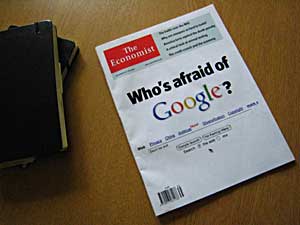On Jaiku’s front page this morning.
Wonderful Jaiku users,
Exciting news, Jaiku is joining Google!
While it’s too soon to comment on specific plans, we look forward to working with our new friends at Google over the coming months to expand in ways we hope you’ll find interesting and useful. Our engineers are excited to be working together and enthusiastic developers lead to great innovation. We look forward to accomplishing great things together. In order to focus on innovation instead of scaling, we have decided to close new user sign-ups for now.
But fear not, all our Jaiku services will stay running the way you are used to and you will be able to invite your friends to Jaiku. We have put together a quick Q&A about the acquisition.
Jyri Engeström and Petteri Koponen, Jaiku Founders
Note the formulation: “Jaiku is joining Google”. Touching, isn’t it.
There’s some surprise in the Blogosphere that Google went for Jaiku rather than the market leader, Twitter. Tim O’Reilly, however, isn’t surprised.

